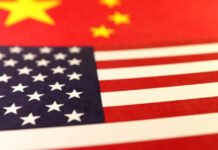U.S. Takes Bold Steps to Bar Chinese and Russian Technology in Automotive Sector
A Major Regulatory Shift
In a significant move that underscores national security concerns, the United States has officially finalized a rule that effectively bans Chinese technology from cars sold in the American market. This decisive action also targets Russian technology, highlighting increasing tensions between the U.S. and these two global powers.
National Security on the Line
The announcement, made public on Tuesday, serves as an essential component of outgoing President Joe Biden’s broader strategy to impose stricter regulations on foreign technology. This follows a lengthy regulatory process aimed at mitigating risks posed by foreign adversaries, particularly in the automotive industry.
Heightened Focus on Drones
The finalized rule isn’t solely about cars. Just this month, Washington has also initiated discussions surrounding new restrictions on drones equipped with technology from adversaries like China and Russia. This multi-faceted approach aims to address a growing roster of national security threats.
The Digital Age of Automotive Technology
"Cars today aren’t just steel on wheels—they’re computers," remarked Commerce Secretary Gina Raimondo during the announcement. In an age where vehicles are equipped with advanced technologies like cameras, microphones, and GPS tracking systems—all interconnected via the internet—this statement emphasizes the importance of cybersecurity in modern transportation.
Targeting Foreign Influence
"This is a targeted approach to ensure we keep PRC and Russian-manufactured technologies off American roads," Raimondo reiterated, referring to the People’s Republic of China. The finalized rules currently apply to passenger vehicles weighing under 10,001 pounds but plans are in motion to expand oversight to commercial vehicles, including trucks and buses, in the near future.
Impact on Electric Vehicles
Among the companies impacted by these restrictions is BYD, a prominent Chinese electric vehicle manufacturer that currently operates a facility in California producing buses and other vehicles. This shift may compel BYD to rethink its strategy in the U.S. market as regulatory pressures mount.
The Race for Domination
According to National Economic Advisor Lael Brainard, "China is trying to dominate the future of the auto industry." The new regulations are designed to safeguard sensitive U.S. data from potential misuse or interference by foreign competitors.
Guidelines for the Auto Industry
Under the new rules, any passenger car manufactured in the U.S. that has "a sufficient nexus" to China or Russia will not be permitted for sale if it incorporates hardware and software designed for external connectivity and autonomous driving. This is a significant shift that could reshape the automotive landscape.
Future Model Years Subject to Restrictions
The prohibition on sales takes effect for the model year 2027, which allows manufacturers some time to adapt. Additionally, the importation of relevant hardware and software linked to Beijing or Moscow is also banned. The software restrictions will also begin to apply in 2027, while hardware restrictions will come into force in 2030.
Strengthening Domestic Industries
As the U.S. moves to limit foreign technology’s foothold in its automotive sector, officials are simultaneously working to bolster domestic industries. This includes initiatives to stimulate growth and innovation within the American tech landscape.
AI Development Efforts Accelerated
In conjunction with these automotive regulations, President Biden issued an executive order aimed at accelerating the development of artificial intelligence infrastructure in the U.S. "We will not let America be out-built when it comes to the technology that will define the future," Biden proclaimed, signaling his administration’s commitment to outpacing foreign competition.
A Transition of Power on the Horizon
While these plans are currently in motion, the responsibility for implementing them will soon transition to President-elect Donald Trump. His administration promises a dramatic shift in policies that could influence how these regulations are executed.
Industry Reactions
The automotive industry is now left to grapple with these new rules, with many manufacturers expressing concern over the potential disruption to their supply chains and innovation efforts. Trade experts are closely monitoring how these regulations will impact future collaborations with foreign technology firms.
Broader Implications for Trade
As the U.S. intensifies its stance against Chinese and Russian technology, the broader implications for international trade relationships become evident. Countries globally are considering reevaluating their own ties with these nations, particularly regarding technology-sharing agreements.
Race Against Time
Manufacturers must now navigate a timeline that requires considerable adjustments to meet these new standards. With businesses under pressure to innovate while also complying with these regulations, the stakes have never been higher.
Consumer Awareness
For American consumers, these changes may lead to a future where vehicles are not only safer but also more secure from foreign influences. Cybersecurity measures will likely become a key selling point in the market as companies adapt to new consumer expectations.
Conclusion: A New Era Begins
The United States’ decision to bar Chinese and Russian technologies from its automotive sector represents a pivotal moment in the intersection of technology and national security. As the automotive landscape evolves, the focus on cybersecurity and national integrity will undoubtedly shape the future of vehicle manufacturing in the U.S. With the winds of change blowing through the industry, it remains to be seen how companies and consumers alike will adapt to this new reality.







